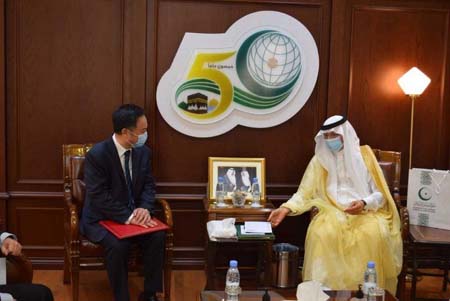
China’s relations with Islamic world reach historic point
Chen Weiqing
On Sunday, I solemnly presented the appointment letter signed by State Councilor and Foreign Minister of the People’s Republic of China (PRC) Wang Yi to Secretary-General of the Organization of Islamic Cooperation (OIC) Dr. Yousef Al-Othaimeen and officially became China’s first representative to the OIC. It is a great honor and also a great responsibility for me to have the opportunity to contribute to China’s friendship with the OIC and individual Islamic countries.
It has been deeply impressed on me that the ties between China and the Islamic world have become ever stronger over the centuries and have reached a historic point.
The communication and friendship between China and the Islamic world, which have lasted for thousands of years, are our precious spiritual wealth. More than 2,000 years ago, China sent envoys to visit West Asia during the Han Dynasty. Ibn Battuta, a great Muslim traveler, visited several Chinese cities, including Quanzhou, Guangzhou, Hangzhou and Beijing, in the 14th century. And the Chinese explorer Zheng He visited Islamic cities such as Makkah, Aden, Mogadishu, Muscat and others in the 15th century.
In modern times, both China and many Islamic countries suffered colonial oppression, sovereignty humiliation, economic difficulties and development hardships. However, since the PRC was established in 1949, under the leadership of the Communist Party of China, the Chinese people have explored with great courage a novel path of development with Chinese characteristics. In this process, China and some other developing countries, including those in the Islamic world, have always supported each other to safeguard common interests and achieve common development.
Tolerance and friendliness are the cultural deposits shared by both China and the Islamic world. The ancient Silk Road has served envoys and businessmen from the two sides, who made frequent exchanges and conducted mutual learning. Today, the Niujie Mosque in Beijing attracts a large number of tourists from all over the world. The 10th-century mosque’s architectural style is a typical example, combining local Chinese culture and Islamic characteristics. More than 50 universities in China offer courses on Arabic language and literature and some even have specialized research institutes on Islamic culture. More and more young Chinese people are eager to join in with the building of the China-Islamic world friendship.
At the same time, Islamic countries are also attaching more importance to discovering, understanding and studying China. The Chinese government has invited delegations from the OIC and its member states to visit Muslim areas in Xinjiang on many occasions, where they have learned the facts concerning Muslims across the province. There are actually many ethnic groups living in Xinjiang, including the Han, Uighurs, Mongols and Hui, who follow many different religions, such as Islam, Buddhism, Christianity and Taoism. From 2010 to 2018, the Uighur population rose from 10.2 million to 12.7 million, an increase of 25 percent, much higher than that of other ethnic groups. Some people are hyping up the so-called “genocide” in Xinjiang, which is obviously contrary to the facts.
Our joint efforts to fight the coronavirus pandemic bear witness to China and the Islamic world’s mutual assistance. The virus outbreak has hit countries around the world, including China and the members of the OIC. In the face of the pandemic, China and the Islamic world have united as one and helped each other contain the virus. The OIC issued a statement backing up China’s efforts to combat the coronavirus disease (COVID-19). After the initial outbreak was brought under control, China’s central government, local governments, enterprises, nongovernmental organizations and individuals worked together to take an active part in the fight against the epidemic in Islamic states. China has provided anti-pandemic supplies to more than 95 percent of Islamic countries, including all African OIC members. To tackle the shortfall in vaccine production capacity and distribution, and enhance the accessibility and affordability of vaccines in the Islamic world, China worked with many countries on vaccine research, development and production.
Our joint efforts to fight the coronavirus pandemic bear witness to China and the Islamic world’s mutual assistance.
As the world today is undergoing profound adjustments and a reformation of sorts, COVID-19 poses a serious threat to human health. While combating the biological virus, we still have to spare the precious energy required to deal with political viruses, such as inverse globalization, unilateralism and protectionism, which are even more devastating. These not only impact the right political pattern and impede the pace of economic recovery globally, but also lead human society to a confusing crossroads. Shall we choose to be united by working together or breed splits and trigger confrontation? Shall we choose to stay modest and tolerant or harbor pride and prejudice? The choices of each individual and each country will finally become a torrent, which will shape our future and create a different epoch. In this regard, the goodwill and cooperation between China and the Islamic world are a perfect model.
Despite being in an era of great change, China has not changed its peaceful development strategy, its willingness to be kind to others or its will to cooperate. Mankind is a community with a shared future. While containing the pandemic at home, China is shouldering its international responsibilities and actively cooperating to help other developing countries surmount the tough obstacles. China is becoming a vital force in dealing with the difficulties. Looking ahead, we will continue to work with the Islamic world to uphold the faith of friendship, anchor the essence of development, jointly encounter challenges, actively build a shared future, and embark on a new journey for the development of friendly relations.
The writer is the Chinese ambassador to Saudi Arabia and representative to the Organization of Islamic Cooperation.
